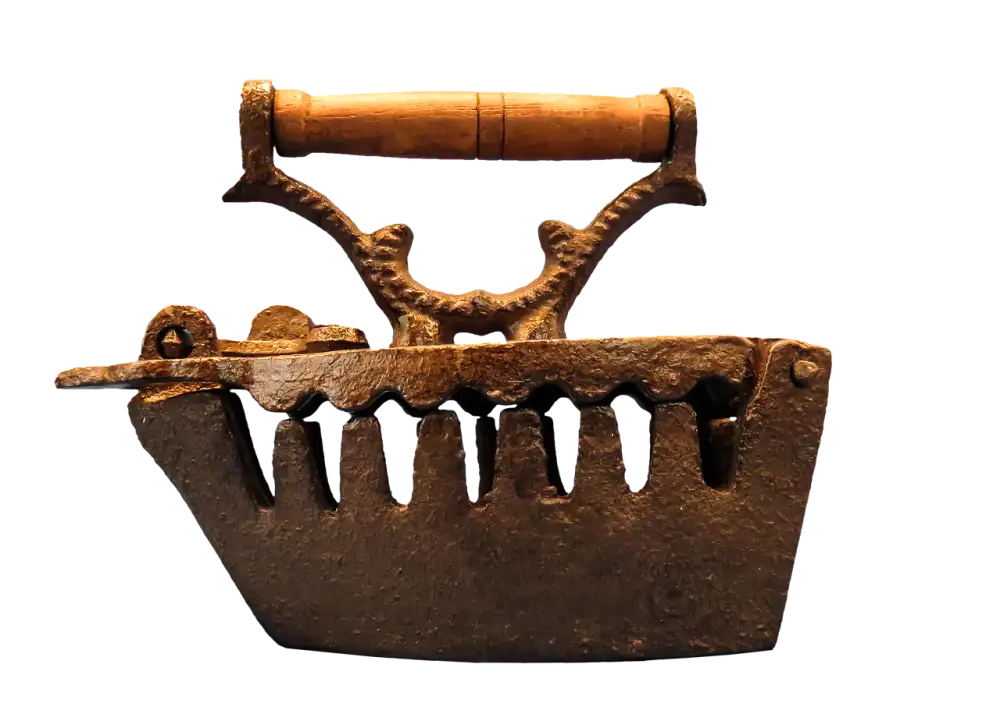Master the Art of Cleaning a Cast Iron Pan: Essential Tips for Home Cooks

- Gather necessary supplies:
- Hot water
- Soft sponge or brush
- Mild dish soap
- Paper towels or clean cloth
- Vegetable oil or shortening
- Let the pan cool down after use.
- Wash the pan with hot water and a soft sponge or brush.
- Use mild dish soap sparingly if needed.
- Dry the pan thoroughly with paper towels or a clean cloth.
- Apply a thin layer of vegetable oil or shortening to the pan.
- Store the cast iron pan in a dry place to prevent rust.
Gather necessary supplies:
To properly clean a cast iron pan, it is essential to gather the necessary supplies beforehand. You will need hot water to help loosen food particles, a soft sponge or brush to scrub without damaging the pan's seasoning, mild dish soap for stubborn residue, paper towels or a clean cloth to dry the pan thoroughly, and vegetable oil or shortening to maintain its non-stick surface. Having these supplies on hand will make the cleaning process efficient and effective.
Hot water
To properly clean a cast iron pan, start by gathering the necessary supplies: hot water, a soft sponge or brush, mild dish soap, paper towels or a clean cloth, and vegetable oil or shortening. After using the pan, allow it to cool down before cleaning. Then, wash the pan with hot water and use a soft sponge or brush to scrub off any food residue. Hot water helps to loosen stuck-on bits without damaging the seasoning of the pan.
Soft sponge or brush
When it comes to cleaning your cast iron pan, using a soft sponge or brush is essential. Avoid using abrasive materials that can damage the seasoned surface of the pan. Gently scrub the pan with hot water and the soft sponge or brush to remove any food residue. This will help preserve the seasoning and prevent any flavors from transferring to future dishes cooked in the pan. Remember, a little elbow grease goes a long way in maintaining the quality of your cast iron cookware.
Mild dish soap
When it comes to cleaning your cast iron pan, using mild dish soap sparingly can be effective in removing stubborn food residue without stripping away the pan's seasoning. It's important to remember that cast iron is porous, so excessive use of soap can lead to the loss of its non-stick properties. If you do choose to use dish soap, opt for a gentle, mild formula and only use it when absolutely necessary. After washing with soap, make sure to rinse the pan thoroughly to remove any soap residue before drying it completely.
Paper towels or clean cloth
After washing the cast iron pan with hot water and a soft sponge or brush, it is crucial to dry it thoroughly to prevent rust. Use paper towels or a clean cloth to wipe away any remaining moisture. Ensure that all water droplets are removed from the surface and crevices of the pan. Any lingering moisture can lead to rust formation, which can damage the pan over time. Properly drying the pan also helps in maintaining its seasoning and prolonging its lifespan.
Vegetable oil or shortening
To maintain the seasoning on your cast iron pan, it's crucial to apply a thin layer of vegetable oil or shortening after each use. This helps to prevent rust and keeps the surface well-conditioned. Simply use a paper towel to spread a small amount of oil all over the pan, including the handle and exterior. Make sure to wipe off any excess oil to avoid a sticky residue. This process not only protects your pan but also enhances its non-stick properties over time. Remember, a well-oiled cast iron pan is a happy cast iron pan!
Let the pan cool down after use.
After cooking with your cast iron pan, it's crucial to allow it to cool down naturally before cleaning. Placing a hot pan under cold water can cause thermal shock and potentially damage the pan. Letting it cool also makes it easier to handle during the cleaning process. Remember that cast iron retains heat well, so use caution when touching the pan even after you've turned off the heat source. By allowing your cast iron pan to cool down properly, you'll ensure its longevity and maintain its cooking performance for years to come.
Wash the pan with hot water and a soft sponge or brush.
Washing a cast iron pan with hot water and a soft sponge or brush is essential to maintain its longevity and cooking performance. After each use, allow the pan to cool down before cleaning to prevent warping. Using hot water helps to loosen food particles, making them easier to remove. Gently scrub the surface with a soft sponge or brush to avoid damaging the seasoning. Avoid using harsh abrasives that can strip away the seasoned layer of the pan.
Use mild dish soap sparingly if needed.
When cleaning a cast iron pan, it's important to use mild dish soap sparingly if needed. Contrary to popular belief, using a small amount of mild dish soap is acceptable and can help remove stubborn food residue without damaging the pan's seasoning. However, be sure to avoid harsh chemicals or abrasive scrubbers that can strip away the pan's protective layer. Remember to rinse the pan thoroughly after using soap to prevent any soapy residue from affecting the flavor of your next meal cooked in the pan.
Dry the pan thoroughly with paper towels or a clean cloth.
After washing the cast iron pan with hot water and a soft sponge or brush, it is crucial to dry it thoroughly to prevent rusting. Use paper towels or a clean cloth to remove all moisture from the surface of the pan. Any remaining water can lead to rust formation, which can damage the pan over time. Ensure that every part of the pan is completely dry before proceeding to the next step in maintaining your cast iron cookware.
Apply a thin layer of vegetable oil or shortening to the pan.
After drying the cast iron pan thoroughly, it is essential to apply a thin layer of vegetable oil or shortening to maintain its seasoning and prevent rust. The oil creates a protective barrier on the surface of the pan, helping to keep it in optimal condition for cooking. Simply use a paper towel to spread a small amount of oil all over the pan, including the handle and outer edges. This step should be done while the pan is still warm from washing to help the oil penetrate and bond with the metal. Remember, a little goes a long way - you want a thin, even coating, so there's no need to overdo it.
Store the cast iron pan in a dry place to prevent rust.
After cleaning and seasoning your cast iron pan, it's crucial to store it properly to prevent rust. Make sure the pan is completely dry before storing it. Store the pan in a dry place away from moisture to avoid any chance of rust forming. You can also place a paper towel or cloth inside the pan to absorb any excess moisture and help maintain its seasoning. By storing your cast iron pan correctly, you can ensure its longevity and continue to enjoy cooking with it for years to come.
Published: 18. 04. 2024
Category: Home



